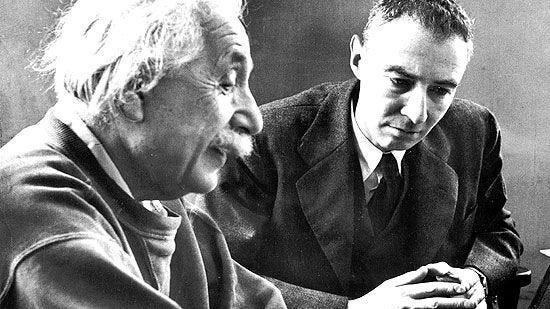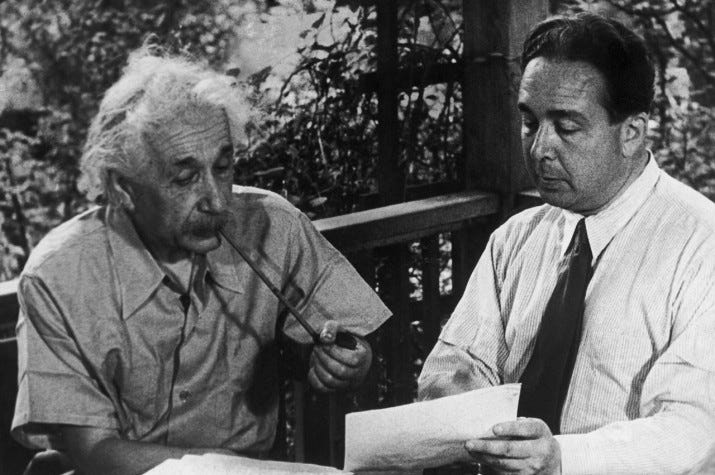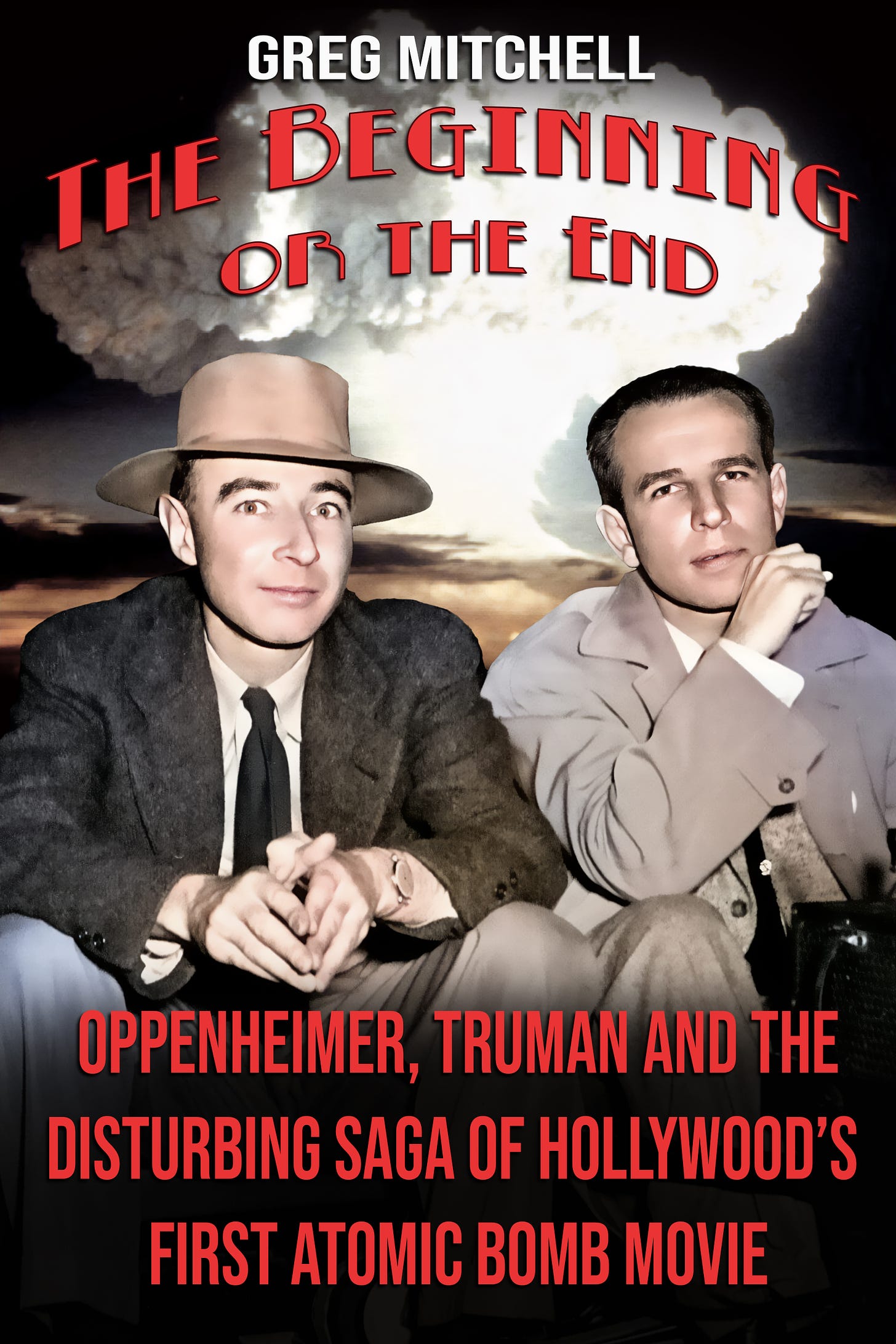Reprinted with permission from Greg Mitchell’s newsletter Oppenheimer: From Hiroshima to Hollywood.

A couple weeks back, I revealed how Robert Oppenheimer, despite deep reservations about the script (“idiotic”) and its many falsehoods, signed a release for MGM in 1946 allowing them to portray him in the first movie about the Bomb, The Beginning or the End (coincidentally the title of my recent book about it).
Obtaining other permissions from key figures to be portrayed would remain a sticky problem for MGM, however. Christopher Nolan, for his new movie, luckily did not face any such obstacles.
Back in 1946, Albert Einstein, a key figure in the Nolan movie, was reputed to be “very cagey about sticking his neck out on such matter,” a leader of a new arms control group warned – and he had already refused to meet with MGM producer Sam Marx in Princeton back in the autumn. Now a member of the activist scientists wrote Einstein, “I know you will not want to lend your name to a picture which misrepresents the military and political implications of the bomb. I hope you will see fit to make the use of your name conditional on your personal approval of the script.” Leo Szilard, in a visit to Einstein, expressed skepticism about any involvement with the studio.
While turning aside requests from MGM to sign a release, Albert Einstein’s support for efforts to control the military uses of splitting the atom only grew. From Princeton he sent a telegram far and wide seeking $200,000 in funds for his new Emergency Committee of Atomic Scientists. It would contain one of the most oft-quoted phrases of the century (italicized below) written by anyone:
Our world faces a crisis as yet unperceived by those possessing power to make great decisions for good or evil. The unleashed power of the atom has changed everything save our modes of thinking, and thus we drift toward unparalleled catastrophe.
Einstein confessed that he and other scientists “who released this immense power have an overwhelming responsibility in this world life-and-death struggle to harness the atom for the benefit of mankind and not for humanity’s destruction. Bethe, Condon, Szilard, Urey, and the Federation of American Scientists join me in this appeal, and beg you to support our efforts to bring realization to America that mankind’s destiny is being decided today – now – at this moment. . . . Urgently request you send immediate check to me as chairman…. We ask your help at this fateful moment as a sign that we scientists do not stand alone.”
In an interview a few days later for The New York Times Magazine, Einstein said:
Today the atomic bomb has altered profoundly the nature of the world as we know it, and the human race consequently finds itself in a new habitat to which it must adapt its thinking. . . . Before the raid on Hiroshima, the leading physicists urged the War Department not to use the bomb against defenseless women and children. The war could have been won without it. The decision was made in consideration of possible future loss of American lives – and now we have to consider the possible loss in future atomic bombings of millions of lives. The American decision may have been a fatal error, for men accustom themselves to thinking that a weapon which was used once can be used again. . . . To the village square we must carry the facts of atomic energy. From there must come America’s voice.
Time magazine would soon feature an illustration of Einstein on its cover – next to an elongated mushroom cloud. But hopes around international control of the atom involving the U.N. had plunged with Truman’s appointment of Wall Street financier Bernard Baruch to “translate” the recent proposals by Acheson, Lilienthal, and Oppenheimer in exchange for White House backing. Oppenheimer told a friend they had “lost.” He despised Baruch and considered him a fool, but felt he might still be able to appeal to his “conscience, that is the best angle I have,” he informed his wife (in a phone conversation tapped and taped by the FBI).
Still, MGM tried desperately to get Einstein’s signature on the dotted line. Turning back the latest attempt, Einstein wrote to MGM chief Louis B. Mayer himself. “Although I am not much of a moviegoer,” he admitted, “I do know from the tenor of earlier films that have come out of your studio that you will understand my reasons. I find that the whole film is written too much from the point of view of the Army and the Army leader of the project, whose influence was not always in the direction which one would desire from the point of view of humanity.”
Mayer, surely miffed but too intimidated to reply in his own words to the world’s most famous genius, instead asked rightwing screenwriter James K. McGuinness to draft a reply he could sign. President Truman, the letter asserted, “was most anxious to have the picture made” and had personally read and approved the script. This apparently was supposed to impress the scientist who had just labeled the Hiroshima decision unwise and warned about the direction of Truman’s current nuclear policies. “As American citizens we are bound to respect the viewpoint of our government,” Mayer advised.
Then there was this classic: “It must be realized that dramatic truth is just as compelling a requirement to us as veritable truth is to a scientist.”
Trying to assure Einstein that his moral views might be included, Mayer informed him that MGM had cast Tom Drake as the fictional ethical scientist. “We selected among our young male players the one who best typifies earnestness and a spiritual quality,” Mayer gushed. “You need only recall his performance in The Green Years,” when Drake portrayed a young Irish orphan.
There was a pretty fair chance that Albert Einstein had missed that picture.

Unlike his friend and fellow physicist Einstein, Leo Szilard (above, right) was willing to at least meet MGM halfway, going so far as offer to trek out to Culver City and rewrite the sections of the script where he was portrayed. He told Sam Marx that he and Einstein would only sign contracts if the studio donated $100,000 to FAS, which had infuriated the producer. Then Leo cut the suggested gift to $5,000, before finally dropping any conditions for signing, beyond approving the script.
Marx surely wondered how Szilard might react if he got a look at the script’s increasingly unsubtle championing of the use of the bomb against Japanese cities. After all, he had authored that famous petition trying to halt that decision the previous summer (an effort that receives some attention in Nolan’s Oppenheimer). Edward Teller planned to circulate it at Los Alamos but was talked out of it by Oppenheimer, who considered it “meddling.”
Groves, who hated Szilard’s bumptious nature and believed the petition undercut the other scientists and jeopardized secrecy, tried that summer to gather evidence that he was a security risk to get him off the bomb project, a move which Oppenheimer reluctantly supported. He also made sure the petition never got to Truman’s desk (and after the war had it classified “secret” so Szilard could not release it to the press). As Szilard spoke out, the FBI followed his movements closely, inspiring the physicist to make a game out of jumping in and out of cabs to shake surveillance. Groves blasted Szilard at length in off-the-record remarks to a Time magazine reporter, concluding, “I don’t like certain Jews, and I don’t like certain well-known characteristics of theirs, but I’m not prejudiced.” (Don’t look for that coming out of good guy Matt Damon’s mouth in Oppenheimer.)
Now, Szilard boarded a train for Los Angeles. When he arrived, Sam Marx showed him some of the footage already shot for the movie. It took Szilard only three days at the studio to rewrite scenes that pictured his crucial early meeting with Einstein about the chances for building an atomic weapon and his early lab work with the bomb project. (Almost certainly he was not shown segments of the film in which he did not appear, such as the use of the bomb against Japan.)
Marx wrote Einstein again, informing him that his friend Szilard “was, to some extent, impressed that we are doing a sincere job and one that will reflect only credit on science.” But the wheedling was still not working. Einstein, who just wanted to be left alone, quickly informed Marx that he had already told his boss, L.B. Mayer, “no,” and he stood by that.
At least for a while. Then Szilard told Einstein he had decided to sign his release after MGM assured him his script rewrites would be honored and sent him the relevant pages. “Have received new script from MGM,” he wired, “and am writing that I have no objection to use of my name in it.” Einstein, no doubt weary of the whole matter and willing to follow Szilard’s lead, scribbled on the back of the telegram a return message, “Agree with use of my name on the basis of new script.”
Sadly, as my book explores, that script would only get worse, and more pro-bomb, as Groves – and then Harry Truman – ordered revisions and re-takes.

Also just published: an expanded edition of my book Atomic Cover-up, now with several thousand words of mine re: the movie and the man Oppenheimer. And it’s on sale this week as an ebook for just $3.99 ($12.95 for the paperback).
Thanks for reading Oppenheimer: From Hiroshima to Hollywood! Subscribe for free to receive new posts and support my work.
Greg Mitchell is the author of a dozen books, including “Hiroshima in America,” and the recent award-winning The Beginning or the End: How Hollywood – and America – Learned to Stop Worrying and Love the Bomb, and has directed three documentary films since 2021, including two for PBS (plus award-winning “Atomic Cover-up”). He has written widely about the atomic bomb and atomic bombings, and their aftermath, for over forty years. He writes often at Oppenheimer: From Hiroshima to Hollywood.




One thought on “When Oppenheimer Caved to Hollywood, While Einstein Resisted”
Comments are closed.